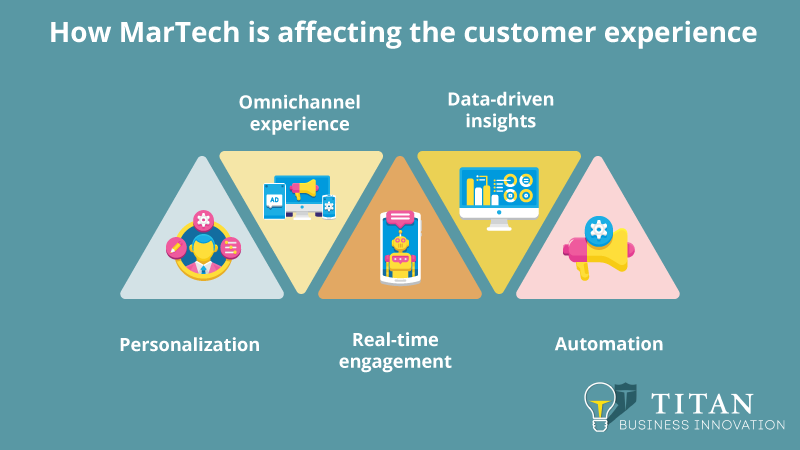MarTech is a term that refers to the combination of marketing and technology. The modern marketing executive uses various technologies, tools, and platforms to assist marketers in achieving their goals, such as reaching out to their target audience, driving traffic to their websites, and generating leads and sales. The ease of use of current technology means all companies can access powerful tools to increase their marketing strategy effectiveness.
The number of tools and technologies to satisfy the demand for MarTech has exploded over the past couple of years. Statista shows 9,500 martech solutions worldwide, up from 150 in 2011. Example tools are customer relationship management (CRM) systems, marketing automation platforms, social media management tools, email marketing platforms, search engine optimization (SEO) tools, analytics software, content management systems, and more.
In the digital age, MarTech is becoming increasingly important as businesses strive to stay ahead of their competition by leveraging the latest technological advances in marketing. In addition, with the vast amount of data available today, MarTech is also essential for marketers to effectively analyze and utilize this data to make informed decisions and optimize their marketing strategies.
MarTech is significantly impacting the customer experience from a digital marketing perspective. By leveraging MarTech tools and platforms, businesses can provide a more personalized and targeted customer experience, increasing engagement, loyalty, and sales.

Here are some ways in which MarTech is affecting the customer experience:
Personalization: CRM systems and marketing automation platforms enable businesses to gather and analyze customer data, such as browsing history, purchase history, and preferences. This information can be used to create personalized marketing messages, content, and offers that resonate with each customer.
Personalization helps the customer understand which of the company’s products best suit them. Personalization, when successful, makes the client feel like the customer is trying to help them rather than just being sold a product.
Omnichannel experience: MarTech tools also help businesses provide a consistent and seamless experience across different channels, such as social media, email, and websites. This ensures that customers can engage with the brand in the way they prefer, and the brand can maintain a consistent message and tone across all channels.
Modern consumers are overwhelmed with information, making the company’s message easily understood through different mediums is vital. In addition, consumers usually spend time researching a company, so having a unified message across all channels builds trust.
Real-time engagement: Tools like chatbots and social media management tools enable businesses to engage with customers in real time, providing quick and efficient solutions to their problems and queries. With the rise of AI, online support is getting much better, and customers no longer accept waiting on long phones for help.
Data-driven insights: MarTech tools also provide valuable insights into customer behavior and preferences, which can be used to optimize marketing campaigns and improve the overall customer experience. Data can help companies anticipate their customer’s needs and provide suitable goods or services at the right time. In addition, planning future products is much more efficient when companies analyze consumer data.
Automation: Technology has made it easier for businesses to automate routine marketing tasks, such as sending emails, social media posts, and SMS messages. This has helped improve the customer experience by delivering relevant and timely messages without manual intervention. In addition, by automating these tasks, businesses can reduce the risk of errors, ensure consistency, and free up staff to focus on more strategic initiatives.

Many successful martech case studies are available as a template and motivation to leverage martech.
Netflix uses machine learning algorithms to recommend content to users based on their viewing history, resulting in a 75% increase in user engagement.
Coca-Cola launched its “Share a Coke” campaign, printing popular names on Coke bottles and cans. Data analytics allowed them to identify the most popular names in each market. The campaign was a huge success and resulted in a 2% increase in sales.
Marriott delivers personalized customer experiences and optimizes its marketing campaigns. The company uses data analytics to understand its customers’ preferences and behavior and tailors its marketing messages accordingly.
Overall, MarTech is helping businesses provide a more personalized, efficient, and engaging experience for their customers, which can lead to increased loyalty and revenue.





